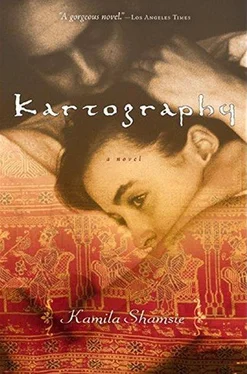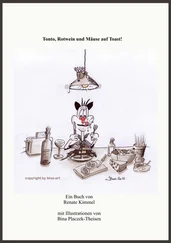‘The music changed,’ he said.
I think the four of them chose that bit of imagery — the waltzing couples changing partners — long ago to avoid having to answer the kind of question I’d just asked. It was obvious why, though I hadn’t given it much thought before. Off the dance floor, synchrony cannot exist. What I really wanted Uncle Ali to tell me — what he really wasn’t going to tell me — was who was the first. Of the four of them, who was the first to decide to twirl away; who was the first, and who was the last?
‘Good thing the record got stuck on “repeat play” after that?’ It was meant to be a statement, but it came out as a question.
Uncle Ali folded up his newspaper — rather hastily, it seemed — and switched off the light. ‘Very good thing. Otherwise you and Karim wouldn’t be. ‘Night, sweetheart.’
I wanted to ask him what made them think everything had worked out for the best before Karim and I came along and proved justification enough, but I was suddenly too drowsy to speak. I pulled Karim’s pillow slightly closer to me and put my head down, grateful for being able to sleep spine to spine with Karim as I had done in the days when cameras in the hands of our parents formed the only memories we were ever to have of those earliest gestures of intimacy. Why grateful? Because sometimes you know you’re standing on a cusp, and you know that in knowing it you’ve gone past the cusp over to the other side, or at least almost entirely so, entirely except for one toe that still hangs on to childhood; one toe or one finger or one shoulder blade curving back to meet another shoulder blade which curves forward to meet yours in a reminder that, if you had wings, this, right here, is where they would sprout.
Can angels lie spine to spine?
If not, how they must envy us humans.
. . .
1970–71
He watched the donkey kicking up red-brown earth between the cottonfields, the fury of its hoofs most likely an expression of disdain for the laughing, twittering creatures behind it, but no matter how fast it ran, spraying wet mud on the cotton-pickers, it could not outpace the cart attached to it, the laughter and shrieks getting louder and more high-pitched as the animal gathered speed. Ears laid flat against its skull, and mouth foaming. Such a fine line between laughter and braying.
Ali clicked his tongue, and turned away. It was ignoble to think of one’s friends in that manner. Ignoble. Zafar would laugh if he heard him use the word. And Maheen would laugh, too, because these days Zafar’s laughter made Maheen laugh, no matter what the cause. He stared gloomily down at the bruise on his thumb. Purple-yellow smudge beneath his nail.
When he looked up again Asif was emerging from the kinoo orchards and walking towards the dunes, the farm manager by his side gesticulating wildly. Asif barely seemed to notice the man as he took a long drag on his cigarette and surveyed his property from behind dark glasses with an air of satisfaction. Who would have thought Asif Marx of Oxford would turn into quite so contented a landowner within three years of returning home? Men who worked on the farm stepped off the path as he approached, their feet sinking in the wet soil of the cottonfields, eyes cast down. Ali wondered if New Year’s Eve meant anything to them.
He followed Asif’s progress through the field and to the sand dunes, where the old nomad woman raised her arms in greeting at his approach and called out to him in a dialect Ali couldn’t understand. But Asif took off his glasses and called back to her, and the nomad woman put her hand on her broad hips and laughed. Ali knew that Asif was going to tell her that, yes, it was all right for her tribe to stay on the dune which belonged to him by law and belonged to her tribe by the laws of tradition. For longer than anyone knew, Asif had told him the night before, the nomad tribe had made this dune part of their migratory patterns. And now some of them wanted to build mud huts and settle, but the villagers and the farm hands considered them untouchables. To tell them that Islam had no concept of untouchables would have been futile, Asif insisted. So instead he had chosen compromise: the nomads could stay as long as they drank water from their own wells, and did not mix with the villagers.
How many walls can one nation erect and sustain, Ali wondered. Is it possible to circumnavigate one wall without crashing into another? He squinted up at the sun, and pressed his thumbnail to test the level of pain.
Panes of glass reflected blinding sunlight, but Maheen knew there were faces pressed against the windows of the house, watching Zafar following her into the back garden, hoping for an indiscretion that could enliven coffee parties in its retelling.
‘Hey, gorgeous.’ Zafar caught the pulloo of her sari and tugged. She twirled towards him, the train of the white sari diaphanous between them. Her hands pressed against his shoulders, and pushed. Zafar fell back against the grass, laughing. Maheen looked up at the windows again.
‘There’s no one there.’ Zafar’s bare feet drummed against her ankles. ‘Come here, come on.’
‘No, darling, don’t be silly. Someone could be watching.’
Zafar lit up a cigarette. He looked like a panther after a rainstorm, with his black turtleneck, catlike eyes, hair slicked down to gleaming, and the assurance with which he reclined on the grass. ‘We’re engaged. We’re allowed to be slightly indiscreet.’
Maheen kicked off her shoes and sat opposite Zafar, her feet pressed against his. ‘There’s enough talk about me as it is, jaanoo, so why add impropriety to the list of my failings?’
Zafar raised himself slightly from his supine position. ‘What are you talking about?’
‘Last week, at the Sind Club. Rukhsana heard your boss singing your praises. Born to be an ad man, he said. Pity about his fiancée. Number of our clients won’t like working with someone who has a Bengali wife. Still, months to go before the wedding. Maybe he’ll see the light by then.’
Zafar pivoted round so that he was sitting beside Maheen. He put an arm around her shoulder, a cigarette dangling between his fingers. ‘So, I’ll change jobs.’
‘You’ll find that attitude everywhere, Zaf.’
‘OK, so I’ll change fiancées.’ He laughed and buried his face in her hair. His hand touched her midriff, between sari and skin, and Maheen covered it with her own hand, pressing his fingers to her flesh for a moment before pulling his hand away, and slapping it lightly. He made a sound of mock exasperation, the fingers of his other hand brushing lightly against her neck as he brought his cigarette to her mouth so she could inhale the headrush. ‘Silly girl. Why do we need the rest of the world?’
Maheen leaned against him. It was this she loved most in him: he could say everything but love was irrelevant, and come so close to making it seem true that when she looked up at the shifting clouds she almost did not see them pulling apart, rending into pieces, wisps of smoke spiralling…
…round the dining table cries of ‘Happy New Year’ stilled as Asif stood up, clinking a fork against his glass.
‘I’m too drunk,’ he said. ‘And I’ve been an appalling host. Plus, I’m a decadant feudal, as Zafar so eloquently reminded us all last night. I will now pause so that you can all contradict me.’
There was silence from the eleven guests around the table, save for muffled sounds behind hands clamped over lips to prevent laughter.
‘Well, if that’s your attitude, none of you are invited back for New Year’s Eve next year,’ Asif said, grandly, waving one arm in the air and tangling it among the streamers that trailed down from the chandelier. ‘Oh, hell. Zaf, you do the toast.’ He fell back into his chair, ripping streamers in two.
Читать дальше












